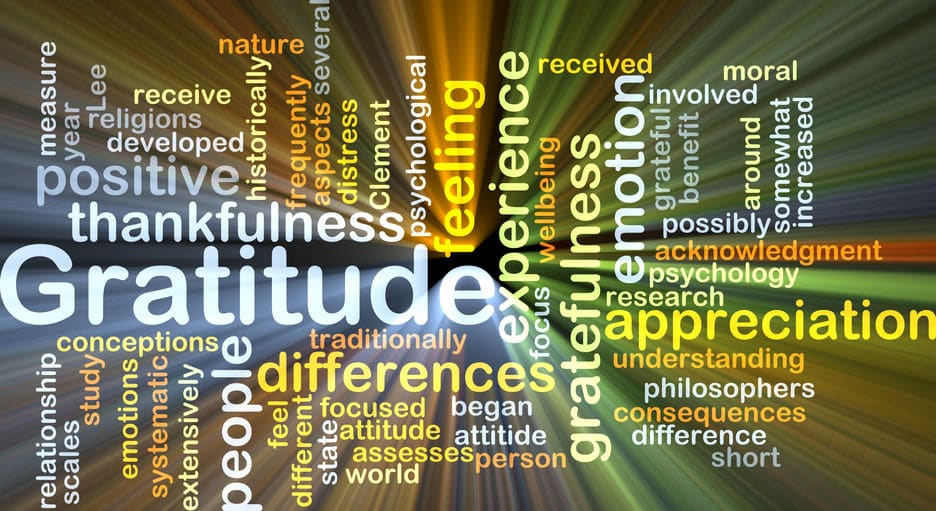by Jennifer Hanawald
Do you have gratitude fatigue? The importance of being grateful gets a ton of press, especially around Thanksgiving. In fact, an Internet search on the importance of gratitude just now turned up about 64,400,000 results in 0.85 seconds. It’s in print, it’s in TED Talks, it’s featured in inspirational quotes superimposed over sunsets. Not only are we encouraged to be grateful, we’ve also been told how to be grateful ad infinitum (97,400,000 hits in 0.83 seconds): think of three good things before bed, share blessings before dinner, start a gratitude journal …
Sometimes, despite our best intentions, gratitude feels rote.
And, as positive psychology coaches, it’s critical for us figure out a way to keep it fresh, for ourselves and for our clients. One way is to stay on top of the research—and there’s a ton of it—showing the immense benefits of gratitude. In fact, through my lens as an integrative health, wellness, and positive psychology life coach, it’s nothing short of mind-blowing. Gratitude has been found to facilitate coping with acute and chronic stress; reduce toxic emotions from social comparisons; improve self-esteem; increase access to positive memories; build social resources and lead to improved relationships; facilitate goal attainment; and promote physical health.
The Case for Gratitude
Specifically with regard to the latter, studies that included gratitude interventions found that, as study subjects increased their experiences of gratitude, they reported better sleep, exercising more, and less trips to the doctor. Other health benefits of gratitude range from lower blood pressure to greater protection against PTSD. Research has also shown that a regular, intentional gratitude practice actually changes the way the brain functions. It’s truly a miracle intervention, without side effects.
The reality is, it’s not that hard to keep it heartfelt in a coaching session, simply by tapping the tools that we teach here at WBI. In fact, from the moment we start our session with some version of “What went well?” to closing a session with “What are you taking away?” we are eliciting gratitude. When we prompt a client to notice what’s working well in one area of life, that’s gratitude. When we help a client analyze what was behind a success—such as sticking with their dietary plan over the holidays, thanks the support of a spouse—that’s gratitude. When we ask the question, “What made that possible?” the response usually reflects an appreciation for something bigger than ourselves.
A Versatile Tool
An interesting thing about gratitude is that it can be used in seemingly opposite circumstances—in moments of celebration and in the midst of daunting challenges. In fact, gratitude can be particularly powerful in tough times, when things are not going well. At the most basic level, we can imagine that things could be even worse. For instance, if our client’s world is falling apart, and they show up to a coaching appointment, at least they managed that. Once we’ve established that things can be worse, we can take a moment to savor the supports we do have. And in tough times, those small treasures—a dog’s loyalty, a friend’s call, a ride to the doctor—are like the small outcrops of rock that climbers find as they make their way up the mountain. We can cling to them, catch a breath, and find our balance. A tiny burst of gratitude can make the difference between inching upwards or sliding down.
We can also look back on a perceived failure and find ways to be grateful. For example: “If I hadn’t struggled to make Cs in school, I might not have the resilience I need today to thrive in a job where we have to fail a lot to succeed.” Or, “If that painful argument hadn’t happened, those differences we had might still be eating me up inside.”
Zooming out, sometimes I think of coaching itself as one huge exercise in gratitude. So whenever gratitude starts to feel like “the G word,” I remind myself to dive deeper than the pithy statements (as lovely and true as they are!), and use what in Zen Buddhism is known as a “beginner’s mind”—an attitude of openness, eagerness, and lack of preconceptions—to tap into the power of this incredibly accessible and infinitely powerful practice.
Jennifer Hanawald, a faculty member for WBI’s coaching courses, is a health coach who helps her clients to live their healthiest and best lives. She holds National Board certification as a Health and Wellness Coach, Duke University certification as an Integrative Health Coach, and a Certificate in Positive Psychology from WBI. Find out more about her work at jenniferhanawald.com.


 Jennifer Hanawald, a faculty member for WBI’s coaching courses, is a health coach who helps her clients to live their healthiest and best lives. She holds National Board certification as a Health and Wellness Coach, Duke University certification as an Integrative Health Coach, and a
Jennifer Hanawald, a faculty member for WBI’s coaching courses, is a health coach who helps her clients to live their healthiest and best lives. She holds National Board certification as a Health and Wellness Coach, Duke University certification as an Integrative Health Coach, and a 